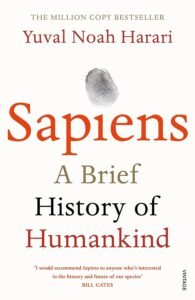“Sapiens” by Yuval Noah Harari provides a sweeping history of the human species, from the emergence of Homo sapiens in Africa to the complexities of modern society. Harari explores how biology and culture have shaped human history, focusing on key revolutions in human development, including the Cognitive, Agricultural, and Scientific Revolutions. The book challenges readers to consider the impact of these revolutions on society, the environment, and the future of humanity.

Key Takeaways:
1. The Cognitive Revolution: Harari argues that the development of complex language and the ability to create and believe in shared myths (e.g., religion, nations, money) were crucial to the success of Homo sapiens over other species.
2. The Agricultural Revolution: Transitioning from foraging to farming fundamentally changed human society, leading to settled communities, social hierarchies, and economic inequalities. However, it also introduced new challenges such as disease and labor exploitation.
3. The Unification of Humankind: The spread of empires, trade, and religions contributed to the unification of the world under common frameworks, leading to the development of global cultures and economies.
4. The Scientific Revolution: This period marked a shift in human understanding of the world, leading to unprecedented technological and scientific advancements that continue to shape modern life. Harari also warns of the potential dangers of biotechnology and artificial intelligence.
5. The Anthropocene: Harari discusses how human activity has become the dominant force shaping the planet, raising questions about sustainability, ethics, and the future of the species.






Discussion about this post